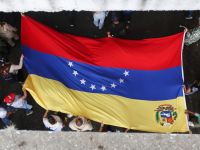The bloody incident near Tel Aviv on Wednesday morning, when a Palestinian bus driver plowed his vehicle at high speed into a crowd of soldiers and civilians standing at a hitchhikers’ station, has sharpened the debate within Israel about the economic and physical separation of the Palestinian and Israeli economies.
Eight people were killed and more than 25 injured in the attack. The bus driver was shot and captured about 20 minutes later, apparently as he was attempting to make his way back home to Gaza.
The fact that the Palestinian was driving a bus owned by Egged, Israel’ largest public transportation cooperative, and was doing so with the full knowledge of the organization, will send tremors through a good number of sectors in the Israeli business community, who to a greater or lesser degree are dependent upon Palestinian labor. The bus driver was holding a legal work permit, which reportedly had been renewed only several days earlier. He was employed by Egged to transport Palestinian day laborers to and from their jobs in central Israel.
In recent weeks the Israeli authorities have permitted a limited number of Palestinians to return to their Israeli places of work, as long as the individuals involved were over the age of 35, and were married with children. Such criteria, the Israelis believe, will sift out those Palestinians who fit the profile of a suicide bomber. But the bus driver involved in this latest incident had all the correct credentials, and so turned the Israelis’ security concept on its head.
The attack itself came as a critical juncture, as negotiating teams from Israel’s Likud and Labor parties appeared to be putting the final touches to an agreement that will result in a national unity government, led by a right-wing prime minister, Ariel Sharon. Likud has traditionally balked at any concept that would create borders—economic or otherwise—between Israel proper and the West Bank and Gaza. On the hand, in its recent campaign on behalf of Ehud Barak’s unsuccessful bid for the premiership, Labor espoused the idea of separation from the Palestinians as the only way in which Israelis can achieve long-term security.
The debate between Likud and Labor to a large degree is one of political expediency. Labor calls for economic separation, because it believes that concern on the part of voters for their personal security will bring them to support Labor’s policy for a geographic as well as economic divorce from the Palestinians. Likud is opposed, not because harbors any grand dreams for economic cooperation with the Palestinians, but rather because a policy in favor of economic separation would undermine its claim on large parts of the West Bank and Gaza.
Indeed, the opposing views of Israel’s two largest political parties tend to shift attention from what is an aboveboard discussion of the economic merits of separation. Those in favor suggest that, while the Palestinians’ economic separation from Israel may be painful in the short and medium term, it would in the long term enable the fledgling Palestinian state achieve a greater level of independence—and, so, not be as exposed the day-to-day turmoil of the political situation. Those opposed say that such a move completely ignores the tenets of the modern economy, and automatically will lead to the Palestinian’s disqualifying themselves from the benefits inherent in being associated with a modern and stable economy.
But, as things are at present, the debate over the merits of separation are for the most part academic. So intertwined are the Israeli and Palestinian economies that, even military closures of the West Bank and Gaza—like the one imposed following Wednesday’s attack—are always temporary. The bottom line is that Israel is greatly dependent upon Palestinian labor, and the Palestinians are dependent on the wages paid by Israeli employers. The bulk of the tax revenue received by the Palestinian Authority is collected by the Israeli tax, social security and customs authorities, most Palestinian imports and exports are channeled through Israeli ports, and the Palestinians are dependent on Israeli bodies for all of the their electricity, and most of their water, fuel and telecommunications services.
Before the start of Intifadat Al-Aqsa in September of last year, up to 100,000 Palestinians traveled to work in Israel on a regular basis, although only 44,000 of them carried official papers. This represented over 20 percent of the employed Palestinian workforce. But the actual net worth of the Palestinians working in Israel far exceeded their numerical strength. According to figures released by the Palestinian Authority, while the average wage per worker in Israel per day equaled 108 shekels ($26.34) at the beginning of 2000, the equivalent average wage per worker on the West Bank was 67 shekels ($16.34) and in Gaza the wage stood at 53 shekels ($12.93).
The business sectors in Israel that are affected most severely by the closure of the Palestinian territories are construction, agriculture, tourism and suppliers of products to the Palestinian areas. Together, says Israel’s ministry of finance, they constitute about 10 percent of Israel’s gross domestic product. Activity in all these sectors plummeted during the fourth quarter of 2000, following the outbreak of violence in the region. Nonetheless, as time continues, the economic effects of the Intifadat Al-Aqsa will become less apparent, at least in agriculture and construction, which will find replacements for the Palestinian workers.
As things stand at present, Israel is unquestionably the Palestinians’ primary trading partner, and the Palestinians are at the very least one of the Israelis’ most important trading partners. In 1999, the year before the outbreak of this current round of violence, Israeli exports to the Palestinian Authority equaled about $2 billion. Imports from the Palestinian areas were $1.6 billion, but $1.1 billion of that amount reflected payments for Palestinians’ labor in Israel. In total, 95 percent of the $500 million worth of real Palestinian exports are sold in or channeled through the Israeli market. The remaining 5 percent was earmarked mainly for other Arab countries.
But the actual volume of Israel’s exports to the Palestinians does not provide a full picture. First, it is important to differentiate between goods of high added value to Israel and goods that the Palestinians imports via Israeli ports—from which Israel derives almost no added value. Some of the latter—which could be referred to as “virtual” exports—are big-ticket items, such as automobiles and heavy machinery. Virtual exports make up large proportion of the export total.
In practical terms, economic separation has to date functioned primarily as a tool used by the Israelis to pressure the more dependent Palestinians. Coupled with military closures that severely restrict movement between different Palestinian-controlled areas, the control that the Israelis have over the amount of goods and capital flowing into the Palestinian territories has enabled them to reduce further the already-dismal standard of living in area. Judging by the increasing level of violence, if Israel’s aim has been to subdue the Palestinians through economic means, then it needs to rethink its strategy.
The Palestinians are also trying to play the same game, albeit on a much smaller scale. Coordinated by the Fatah official Marwan Barghouti, a boycott of Israeli consumer products in areas controlled by the Palestinian is being enforced. But its significance from Israel’s perspective is likely to be mainly symbolic. For their part the Palestinians say that the boycott is designed to promote the growth of local industry.
The fact of the matter is that even if there were no economic cost whatsoever, Israel is reluctant and most probably cannot afford to apply all its economic muscle, by unilaterally disengaging from the Palestinians. The political price it would pay internationally, by turning off the electricity or the water supply, cutting telephone communications, imposing a hermetic embargo, or withholding all tax revenues, would far outweigh the dubious benefits of a forced settlement upon the Palestinians—assuming that the Palestinians would ever capitulate.
In the meantime, it is clear to most in the Israeli political and economic establishment that, when it comes to the Palestinians, the words of the old song remain true: “Can’t live with you; can’t live without you.” – (Albawaba-MEBG)
© 2001 Mena Report (www.menareport.com)







